Negotiation Approaches: A Training Needs Analysis for United Beverages Pty. Ltd.
VerifiedAdded on 2024/06/05
|15
|2278
|360
AI Summary
This report examines the training needs of United Beverages Pty. Ltd. staff in negotiation skills. It analyzes two major approaches: competitive positional-based negotiation and problem-solving interest-based negotiation. The report explores the characteristics, assumptions, risks, and impact on relationships of each approach, providing insights for effective training and development.
Contribute Materials
Your contribution can guide someone’s learning journey. Share your
documents today.

Business Communication
1
1
Secure Best Marks with AI Grader
Need help grading? Try our AI Grader for instant feedback on your assignments.
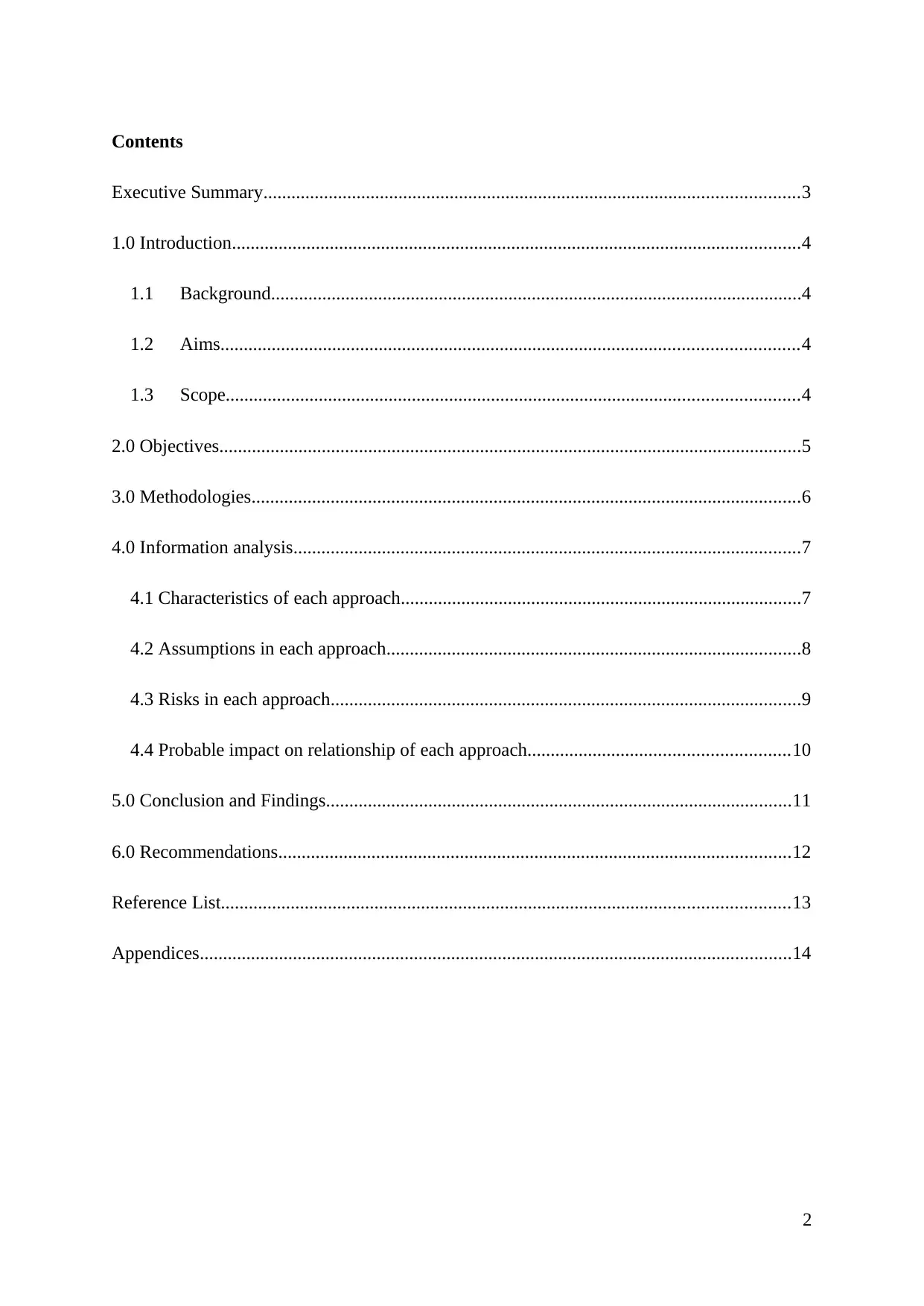
Contents
Executive Summary...................................................................................................................3
1.0 Introduction..........................................................................................................................4
1.1 Background..................................................................................................................4
1.2 Aims............................................................................................................................4
1.3 Scope...........................................................................................................................4
2.0 Objectives.............................................................................................................................5
3.0 Methodologies......................................................................................................................6
4.0 Information analysis.............................................................................................................7
4.1 Characteristics of each approach......................................................................................7
4.2 Assumptions in each approach.........................................................................................8
4.3 Risks in each approach.....................................................................................................9
4.4 Probable impact on relationship of each approach........................................................10
5.0 Conclusion and Findings....................................................................................................11
6.0 Recommendations..............................................................................................................12
Reference List..........................................................................................................................13
Appendices...............................................................................................................................14
2
Executive Summary...................................................................................................................3
1.0 Introduction..........................................................................................................................4
1.1 Background..................................................................................................................4
1.2 Aims............................................................................................................................4
1.3 Scope...........................................................................................................................4
2.0 Objectives.............................................................................................................................5
3.0 Methodologies......................................................................................................................6
4.0 Information analysis.............................................................................................................7
4.1 Characteristics of each approach......................................................................................7
4.2 Assumptions in each approach.........................................................................................8
4.3 Risks in each approach.....................................................................................................9
4.4 Probable impact on relationship of each approach........................................................10
5.0 Conclusion and Findings....................................................................................................11
6.0 Recommendations..............................................................................................................12
Reference List..........................................................................................................................13
Appendices...............................................................................................................................14
2
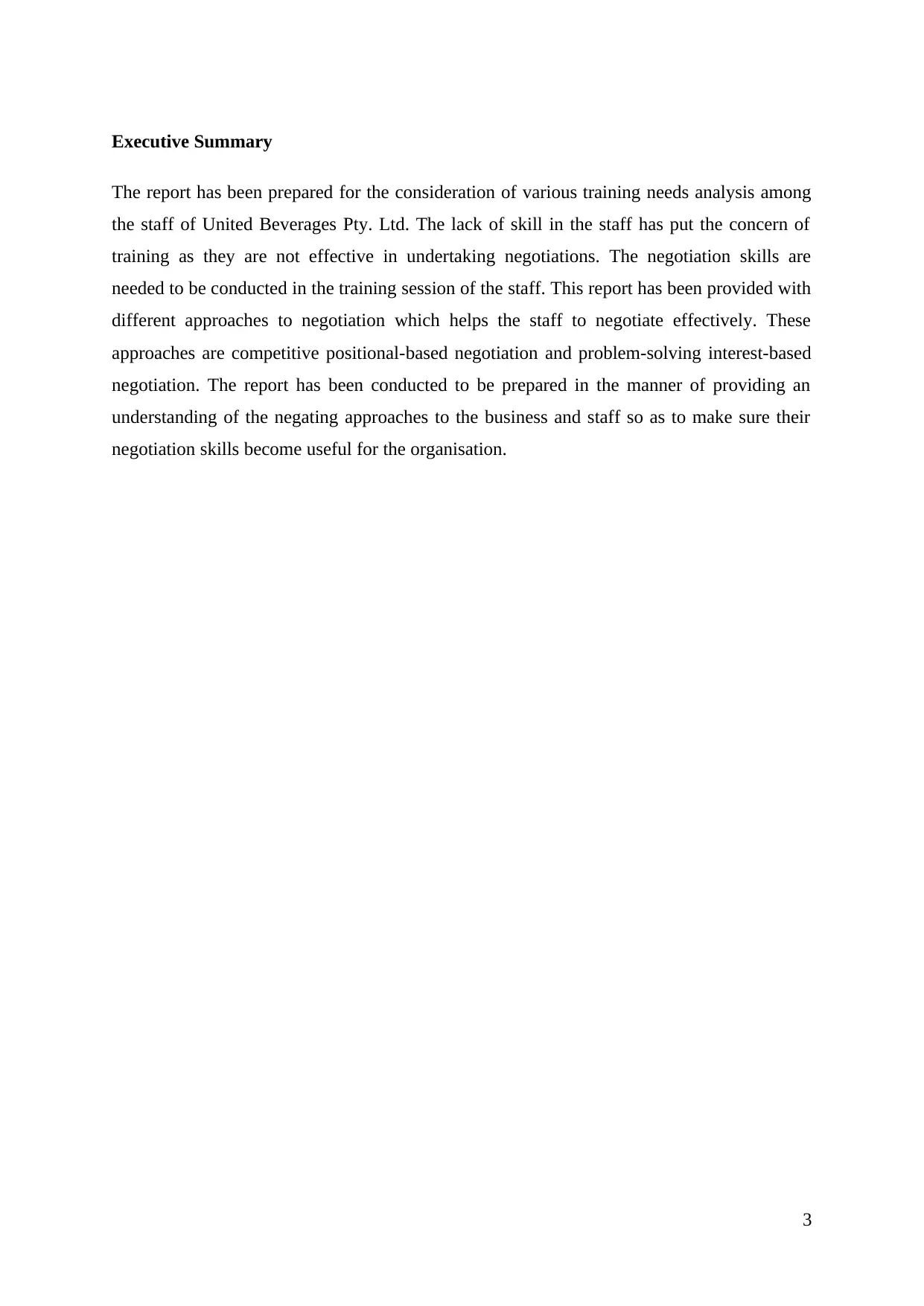
Executive Summary
The report has been prepared for the consideration of various training needs analysis among
the staff of United Beverages Pty. Ltd. The lack of skill in the staff has put the concern of
training as they are not effective in undertaking negotiations. The negotiation skills are
needed to be conducted in the training session of the staff. This report has been provided with
different approaches to negotiation which helps the staff to negotiate effectively. These
approaches are competitive positional-based negotiation and problem-solving interest-based
negotiation. The report has been conducted to be prepared in the manner of providing an
understanding of the negating approaches to the business and staff so as to make sure their
negotiation skills become useful for the organisation.
3
The report has been prepared for the consideration of various training needs analysis among
the staff of United Beverages Pty. Ltd. The lack of skill in the staff has put the concern of
training as they are not effective in undertaking negotiations. The negotiation skills are
needed to be conducted in the training session of the staff. This report has been provided with
different approaches to negotiation which helps the staff to negotiate effectively. These
approaches are competitive positional-based negotiation and problem-solving interest-based
negotiation. The report has been conducted to be prepared in the manner of providing an
understanding of the negating approaches to the business and staff so as to make sure their
negotiation skills become useful for the organisation.
3
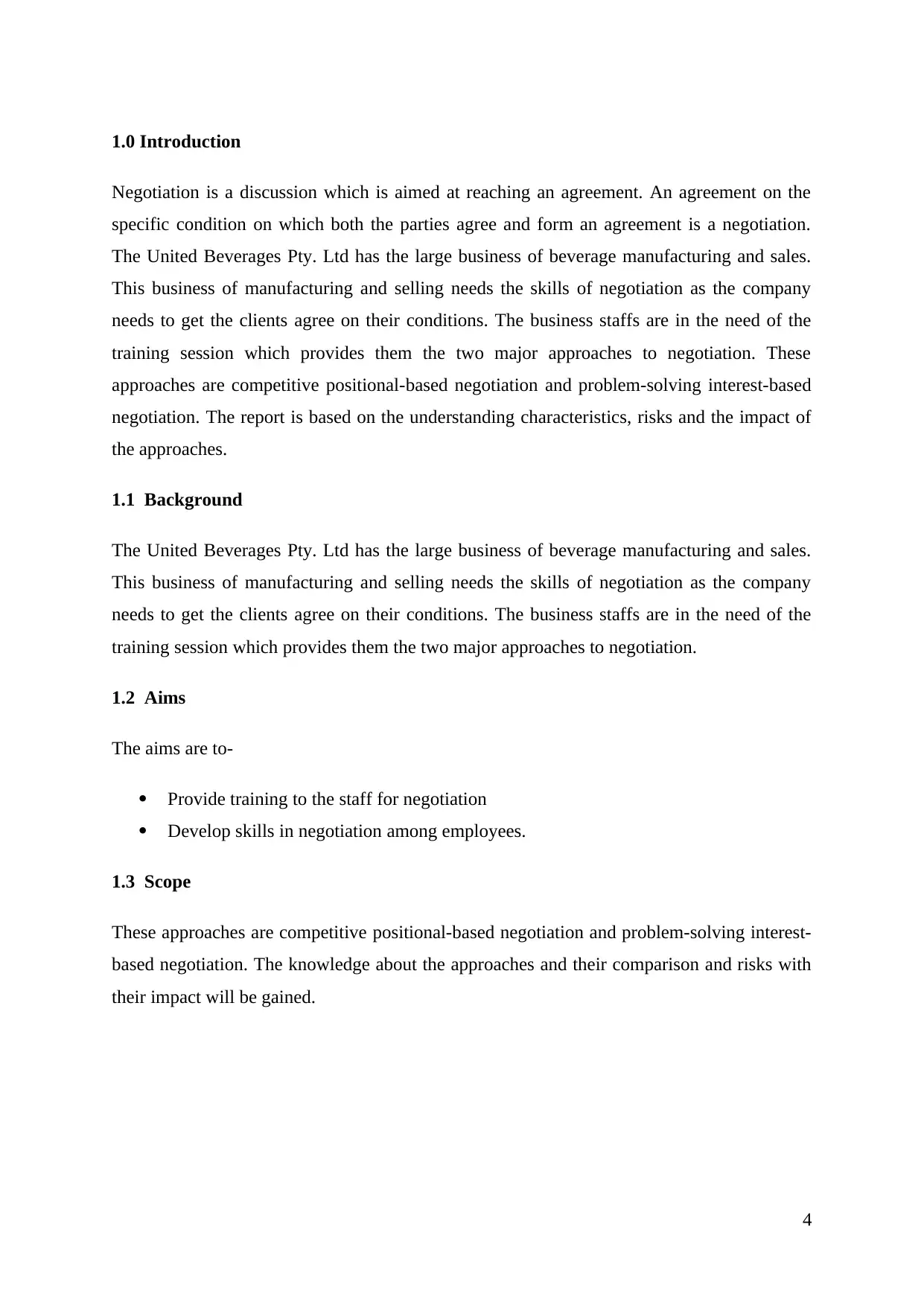
1.0 Introduction
Negotiation is a discussion which is aimed at reaching an agreement. An agreement on the
specific condition on which both the parties agree and form an agreement is a negotiation.
The United Beverages Pty. Ltd has the large business of beverage manufacturing and sales.
This business of manufacturing and selling needs the skills of negotiation as the company
needs to get the clients agree on their conditions. The business staffs are in the need of the
training session which provides them the two major approaches to negotiation. These
approaches are competitive positional-based negotiation and problem-solving interest-based
negotiation. The report is based on the understanding characteristics, risks and the impact of
the approaches.
1.1 Background
The United Beverages Pty. Ltd has the large business of beverage manufacturing and sales.
This business of manufacturing and selling needs the skills of negotiation as the company
needs to get the clients agree on their conditions. The business staffs are in the need of the
training session which provides them the two major approaches to negotiation.
1.2 Aims
The aims are to-
Provide training to the staff for negotiation
Develop skills in negotiation among employees.
1.3 Scope
These approaches are competitive positional-based negotiation and problem-solving interest-
based negotiation. The knowledge about the approaches and their comparison and risks with
their impact will be gained.
4
Negotiation is a discussion which is aimed at reaching an agreement. An agreement on the
specific condition on which both the parties agree and form an agreement is a negotiation.
The United Beverages Pty. Ltd has the large business of beverage manufacturing and sales.
This business of manufacturing and selling needs the skills of negotiation as the company
needs to get the clients agree on their conditions. The business staffs are in the need of the
training session which provides them the two major approaches to negotiation. These
approaches are competitive positional-based negotiation and problem-solving interest-based
negotiation. The report is based on the understanding characteristics, risks and the impact of
the approaches.
1.1 Background
The United Beverages Pty. Ltd has the large business of beverage manufacturing and sales.
This business of manufacturing and selling needs the skills of negotiation as the company
needs to get the clients agree on their conditions. The business staffs are in the need of the
training session which provides them the two major approaches to negotiation.
1.2 Aims
The aims are to-
Provide training to the staff for negotiation
Develop skills in negotiation among employees.
1.3 Scope
These approaches are competitive positional-based negotiation and problem-solving interest-
based negotiation. The knowledge about the approaches and their comparison and risks with
their impact will be gained.
4
Secure Best Marks with AI Grader
Need help grading? Try our AI Grader for instant feedback on your assignments.

2.0 Objectives
The objective of this report is to-
Analyse the need for training in the United Beverages Pty. Ltd.
Provide information to the manager for the training needs and requirements.
5
The objective of this report is to-
Analyse the need for training in the United Beverages Pty. Ltd.
Provide information to the manager for the training needs and requirements.
5
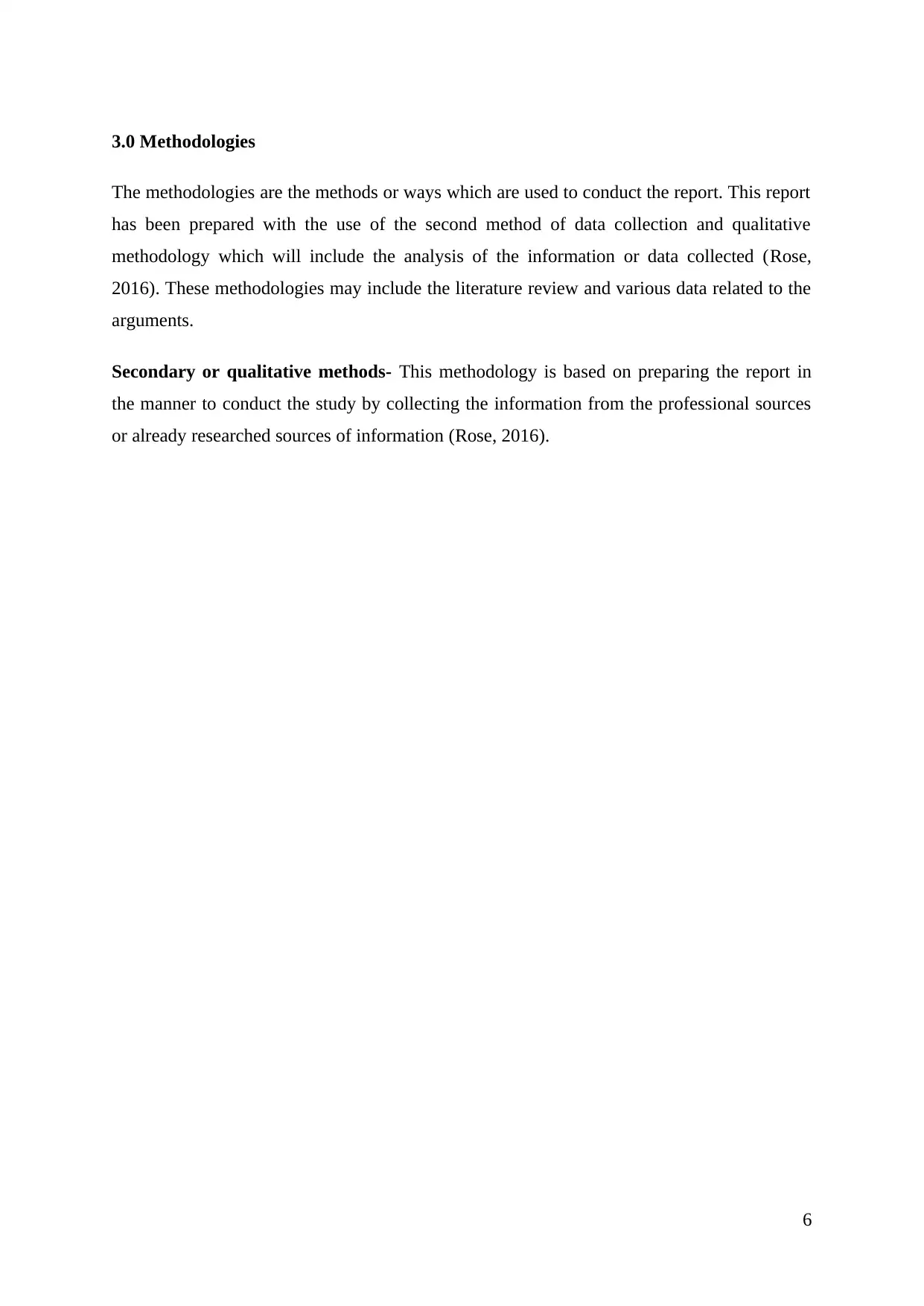
3.0 Methodologies
The methodologies are the methods or ways which are used to conduct the report. This report
has been prepared with the use of the second method of data collection and qualitative
methodology which will include the analysis of the information or data collected (Rose,
2016). These methodologies may include the literature review and various data related to the
arguments.
Secondary or qualitative methods- This methodology is based on preparing the report in
the manner to conduct the study by collecting the information from the professional sources
or already researched sources of information (Rose, 2016).
6
The methodologies are the methods or ways which are used to conduct the report. This report
has been prepared with the use of the second method of data collection and qualitative
methodology which will include the analysis of the information or data collected (Rose,
2016). These methodologies may include the literature review and various data related to the
arguments.
Secondary or qualitative methods- This methodology is based on preparing the report in
the manner to conduct the study by collecting the information from the professional sources
or already researched sources of information (Rose, 2016).
6
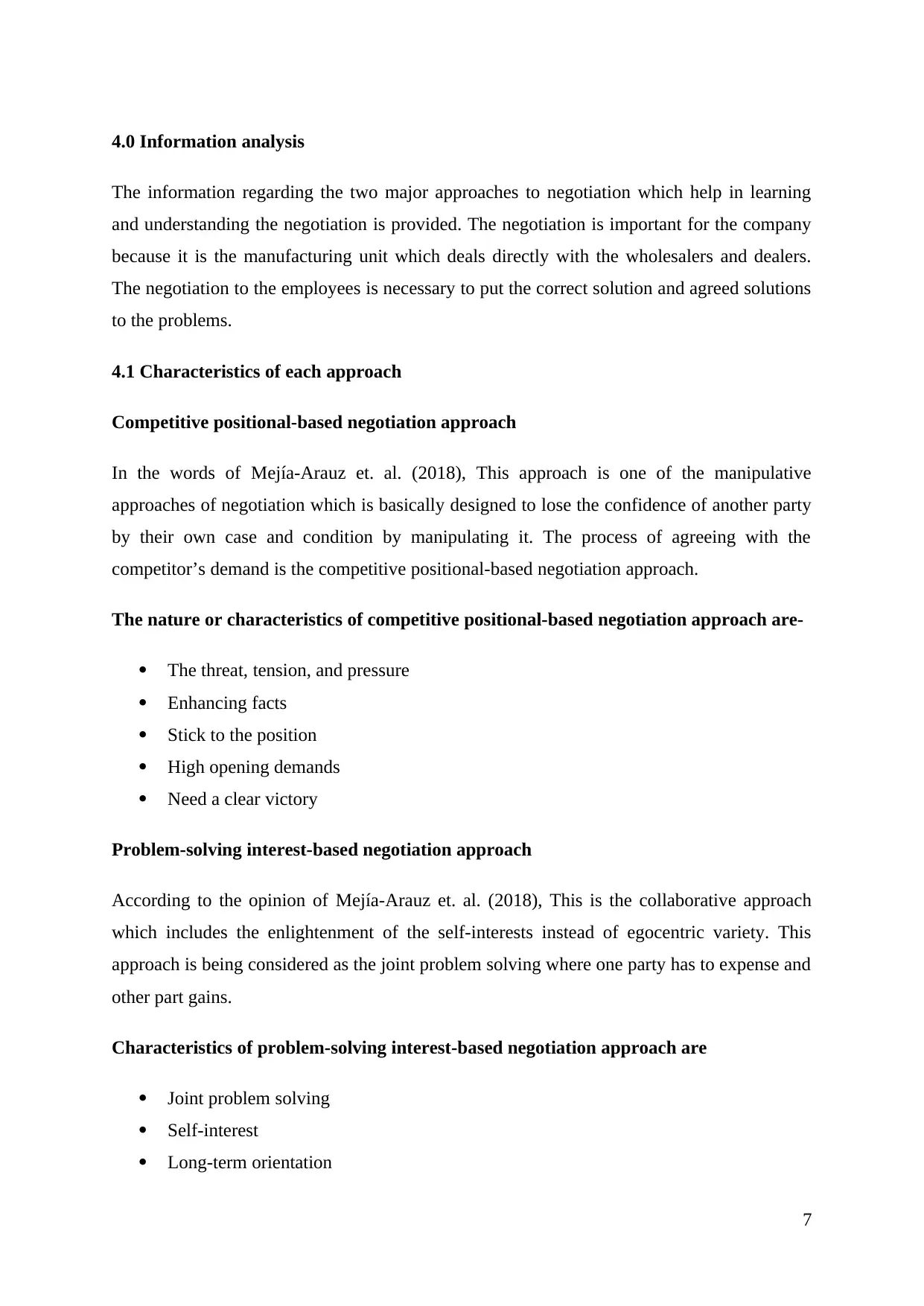
4.0 Information analysis
The information regarding the two major approaches to negotiation which help in learning
and understanding the negotiation is provided. The negotiation is important for the company
because it is the manufacturing unit which deals directly with the wholesalers and dealers.
The negotiation to the employees is necessary to put the correct solution and agreed solutions
to the problems.
4.1 Characteristics of each approach
Competitive positional-based negotiation approach
In the words of Mejía-Arauz et. al. (2018), This approach is one of the manipulative
approaches of negotiation which is basically designed to lose the confidence of another party
by their own case and condition by manipulating it. The process of agreeing with the
competitor’s demand is the competitive positional-based negotiation approach.
The nature or characteristics of competitive positional-based negotiation approach are-
The threat, tension, and pressure
Enhancing facts
Stick to the position
High opening demands
Need a clear victory
Problem-solving interest-based negotiation approach
According to the opinion of Mejía-Arauz et. al. (2018), This is the collaborative approach
which includes the enlightenment of the self-interests instead of egocentric variety. This
approach is being considered as the joint problem solving where one party has to expense and
other part gains.
Characteristics of problem-solving interest-based negotiation approach are
Joint problem solving
Self-interest
Long-term orientation
7
The information regarding the two major approaches to negotiation which help in learning
and understanding the negotiation is provided. The negotiation is important for the company
because it is the manufacturing unit which deals directly with the wholesalers and dealers.
The negotiation to the employees is necessary to put the correct solution and agreed solutions
to the problems.
4.1 Characteristics of each approach
Competitive positional-based negotiation approach
In the words of Mejía-Arauz et. al. (2018), This approach is one of the manipulative
approaches of negotiation which is basically designed to lose the confidence of another party
by their own case and condition by manipulating it. The process of agreeing with the
competitor’s demand is the competitive positional-based negotiation approach.
The nature or characteristics of competitive positional-based negotiation approach are-
The threat, tension, and pressure
Enhancing facts
Stick to the position
High opening demands
Need a clear victory
Problem-solving interest-based negotiation approach
According to the opinion of Mejía-Arauz et. al. (2018), This is the collaborative approach
which includes the enlightenment of the self-interests instead of egocentric variety. This
approach is being considered as the joint problem solving where one party has to expense and
other part gains.
Characteristics of problem-solving interest-based negotiation approach are
Joint problem solving
Self-interest
Long-term orientation
7
Paraphrase This Document
Need a fresh take? Get an instant paraphrase of this document with our AI Paraphraser
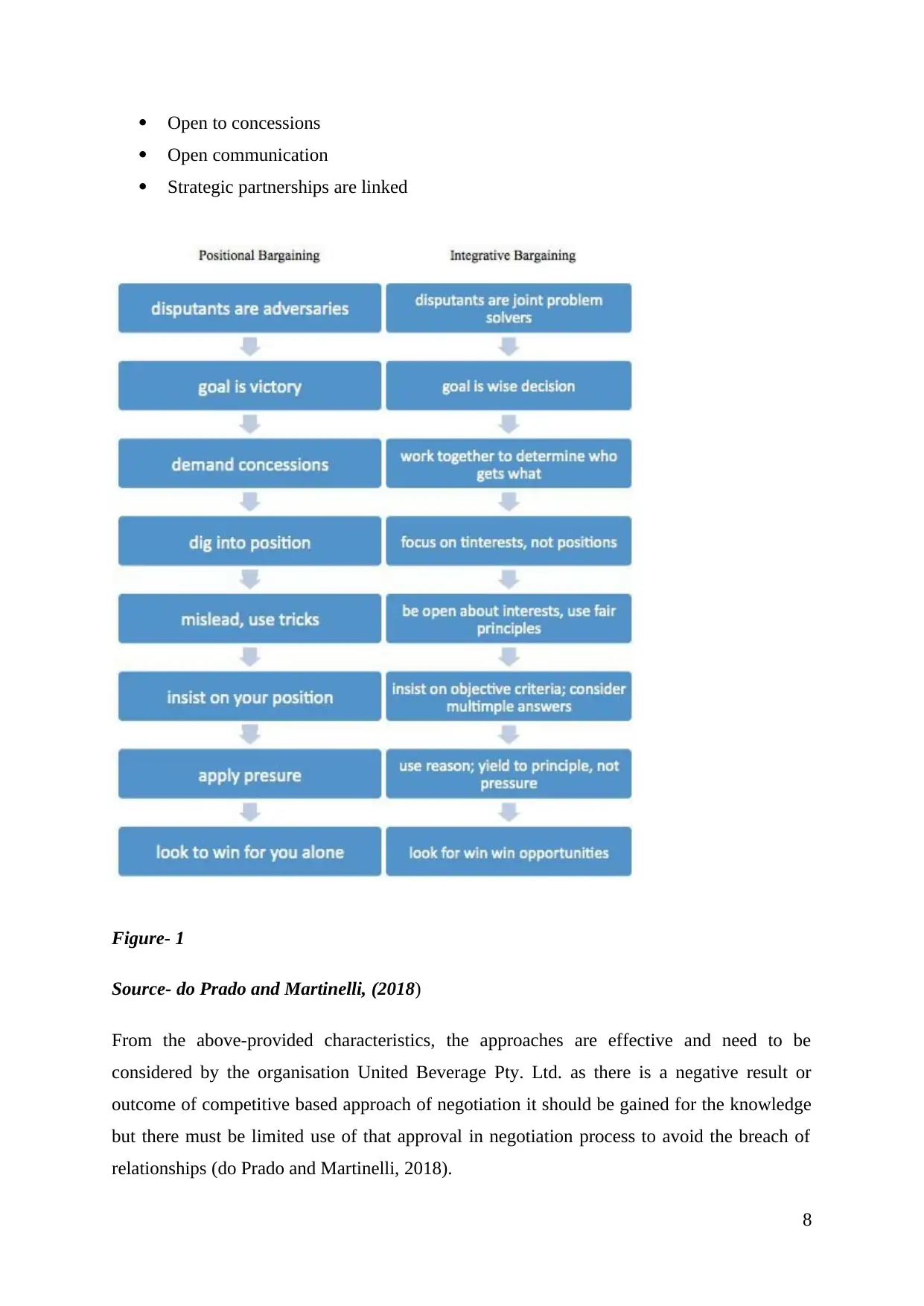
Open to concessions
Open communication
Strategic partnerships are linked
Figure- 1
Source- do Prado and Martinelli, (2018)
From the above-provided characteristics, the approaches are effective and need to be
considered by the organisation United Beverage Pty. Ltd. as there is a negative result or
outcome of competitive based approach of negotiation it should be gained for the knowledge
but there must be limited use of that approval in negotiation process to avoid the breach of
relationships (do Prado and Martinelli, 2018).
8
Open communication
Strategic partnerships are linked
Figure- 1
Source- do Prado and Martinelli, (2018)
From the above-provided characteristics, the approaches are effective and need to be
considered by the organisation United Beverage Pty. Ltd. as there is a negative result or
outcome of competitive based approach of negotiation it should be gained for the knowledge
but there must be limited use of that approval in negotiation process to avoid the breach of
relationships (do Prado and Martinelli, 2018).
8
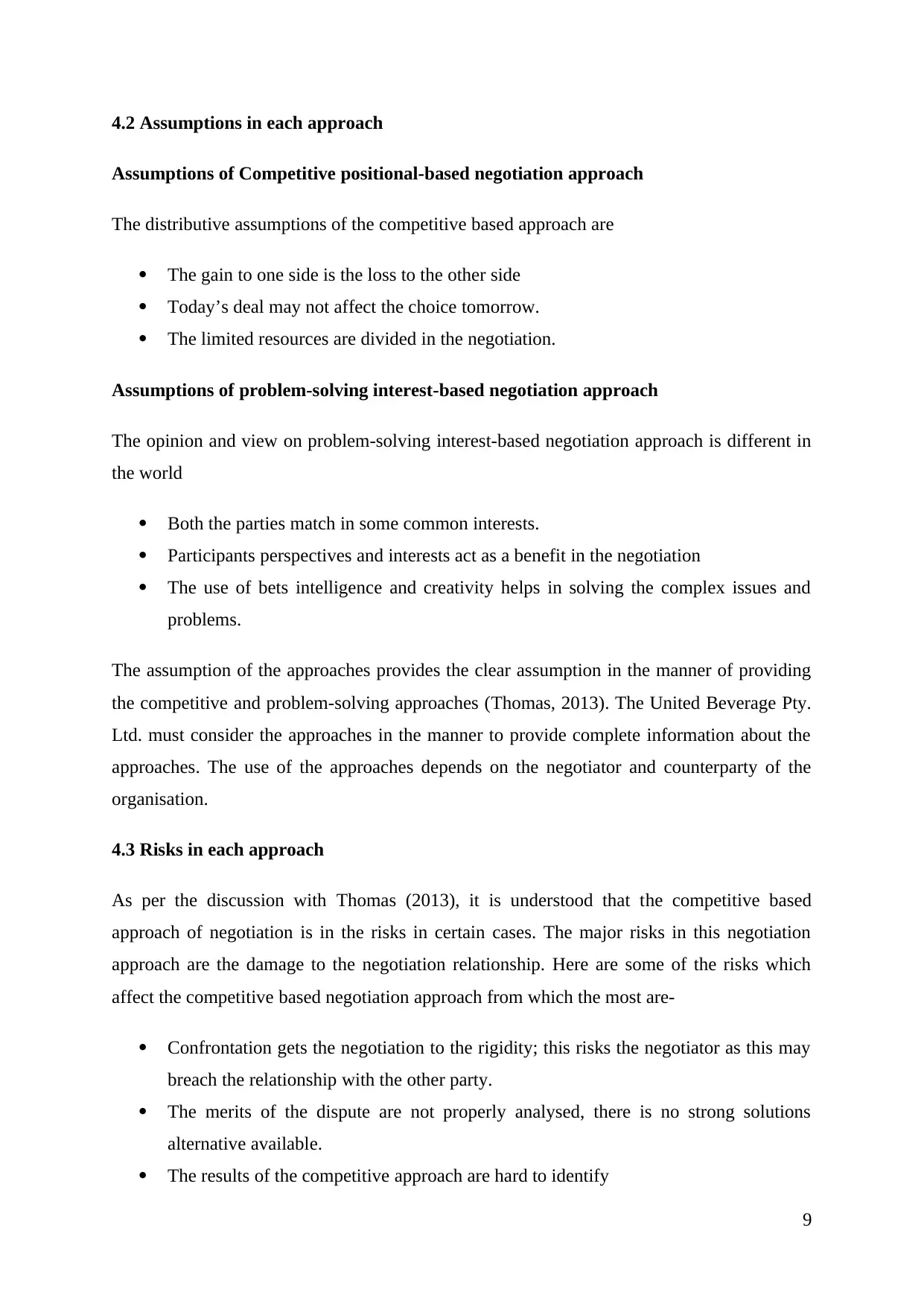
4.2 Assumptions in each approach
Assumptions of Competitive positional-based negotiation approach
The distributive assumptions of the competitive based approach are
The gain to one side is the loss to the other side
Today’s deal may not affect the choice tomorrow.
The limited resources are divided in the negotiation.
Assumptions of problem-solving interest-based negotiation approach
The opinion and view on problem-solving interest-based negotiation approach is different in
the world
Both the parties match in some common interests.
Participants perspectives and interests act as a benefit in the negotiation
The use of bets intelligence and creativity helps in solving the complex issues and
problems.
The assumption of the approaches provides the clear assumption in the manner of providing
the competitive and problem-solving approaches (Thomas, 2013). The United Beverage Pty.
Ltd. must consider the approaches in the manner to provide complete information about the
approaches. The use of the approaches depends on the negotiator and counterparty of the
organisation.
4.3 Risks in each approach
As per the discussion with Thomas (2013), it is understood that the competitive based
approach of negotiation is in the risks in certain cases. The major risks in this negotiation
approach are the damage to the negotiation relationship. Here are some of the risks which
affect the competitive based negotiation approach from which the most are-
Confrontation gets the negotiation to the rigidity; this risks the negotiator as this may
breach the relationship with the other party.
The merits of the dispute are not properly analysed, there is no strong solutions
alternative available.
The results of the competitive approach are hard to identify
9
Assumptions of Competitive positional-based negotiation approach
The distributive assumptions of the competitive based approach are
The gain to one side is the loss to the other side
Today’s deal may not affect the choice tomorrow.
The limited resources are divided in the negotiation.
Assumptions of problem-solving interest-based negotiation approach
The opinion and view on problem-solving interest-based negotiation approach is different in
the world
Both the parties match in some common interests.
Participants perspectives and interests act as a benefit in the negotiation
The use of bets intelligence and creativity helps in solving the complex issues and
problems.
The assumption of the approaches provides the clear assumption in the manner of providing
the competitive and problem-solving approaches (Thomas, 2013). The United Beverage Pty.
Ltd. must consider the approaches in the manner to provide complete information about the
approaches. The use of the approaches depends on the negotiator and counterparty of the
organisation.
4.3 Risks in each approach
As per the discussion with Thomas (2013), it is understood that the competitive based
approach of negotiation is in the risks in certain cases. The major risks in this negotiation
approach are the damage to the negotiation relationship. Here are some of the risks which
affect the competitive based negotiation approach from which the most are-
Confrontation gets the negotiation to the rigidity; this risks the negotiator as this may
breach the relationship with the other party.
The merits of the dispute are not properly analysed, there is no strong solutions
alternative available.
The results of the competitive approach are hard to identify
9
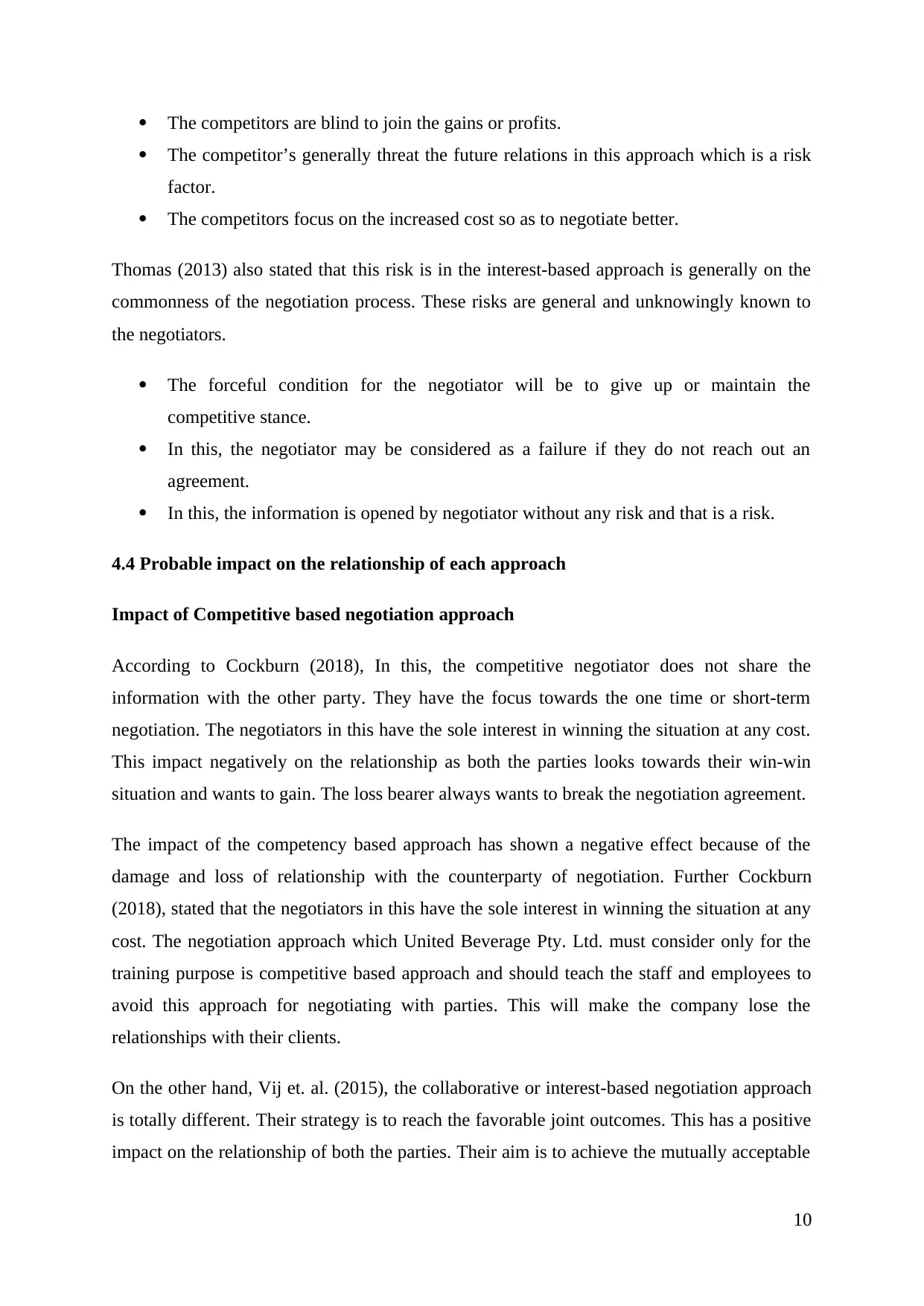
The competitors are blind to join the gains or profits.
The competitor’s generally threat the future relations in this approach which is a risk
factor.
The competitors focus on the increased cost so as to negotiate better.
Thomas (2013) also stated that this risk is in the interest-based approach is generally on the
commonness of the negotiation process. These risks are general and unknowingly known to
the negotiators.
The forceful condition for the negotiator will be to give up or maintain the
competitive stance.
In this, the negotiator may be considered as a failure if they do not reach out an
agreement.
In this, the information is opened by negotiator without any risk and that is a risk.
4.4 Probable impact on the relationship of each approach
Impact of Competitive based negotiation approach
According to Cockburn (2018), In this, the competitive negotiator does not share the
information with the other party. They have the focus towards the one time or short-term
negotiation. The negotiators in this have the sole interest in winning the situation at any cost.
This impact negatively on the relationship as both the parties looks towards their win-win
situation and wants to gain. The loss bearer always wants to break the negotiation agreement.
The impact of the competency based approach has shown a negative effect because of the
damage and loss of relationship with the counterparty of negotiation. Further Cockburn
(2018), stated that the negotiators in this have the sole interest in winning the situation at any
cost. The negotiation approach which United Beverage Pty. Ltd. must consider only for the
training purpose is competitive based approach and should teach the staff and employees to
avoid this approach for negotiating with parties. This will make the company lose the
relationships with their clients.
On the other hand, Vij et. al. (2015), the collaborative or interest-based negotiation approach
is totally different. Their strategy is to reach the favorable joint outcomes. This has a positive
impact on the relationship of both the parties. Their aim is to achieve the mutually acceptable
10
The competitor’s generally threat the future relations in this approach which is a risk
factor.
The competitors focus on the increased cost so as to negotiate better.
Thomas (2013) also stated that this risk is in the interest-based approach is generally on the
commonness of the negotiation process. These risks are general and unknowingly known to
the negotiators.
The forceful condition for the negotiator will be to give up or maintain the
competitive stance.
In this, the negotiator may be considered as a failure if they do not reach out an
agreement.
In this, the information is opened by negotiator without any risk and that is a risk.
4.4 Probable impact on the relationship of each approach
Impact of Competitive based negotiation approach
According to Cockburn (2018), In this, the competitive negotiator does not share the
information with the other party. They have the focus towards the one time or short-term
negotiation. The negotiators in this have the sole interest in winning the situation at any cost.
This impact negatively on the relationship as both the parties looks towards their win-win
situation and wants to gain. The loss bearer always wants to break the negotiation agreement.
The impact of the competency based approach has shown a negative effect because of the
damage and loss of relationship with the counterparty of negotiation. Further Cockburn
(2018), stated that the negotiators in this have the sole interest in winning the situation at any
cost. The negotiation approach which United Beverage Pty. Ltd. must consider only for the
training purpose is competitive based approach and should teach the staff and employees to
avoid this approach for negotiating with parties. This will make the company lose the
relationships with their clients.
On the other hand, Vij et. al. (2015), the collaborative or interest-based negotiation approach
is totally different. Their strategy is to reach the favorable joint outcomes. This has a positive
impact on the relationship of both the parties. Their aim is to achieve the mutually acceptable
10
Secure Best Marks with AI Grader
Need help grading? Try our AI Grader for instant feedback on your assignments.
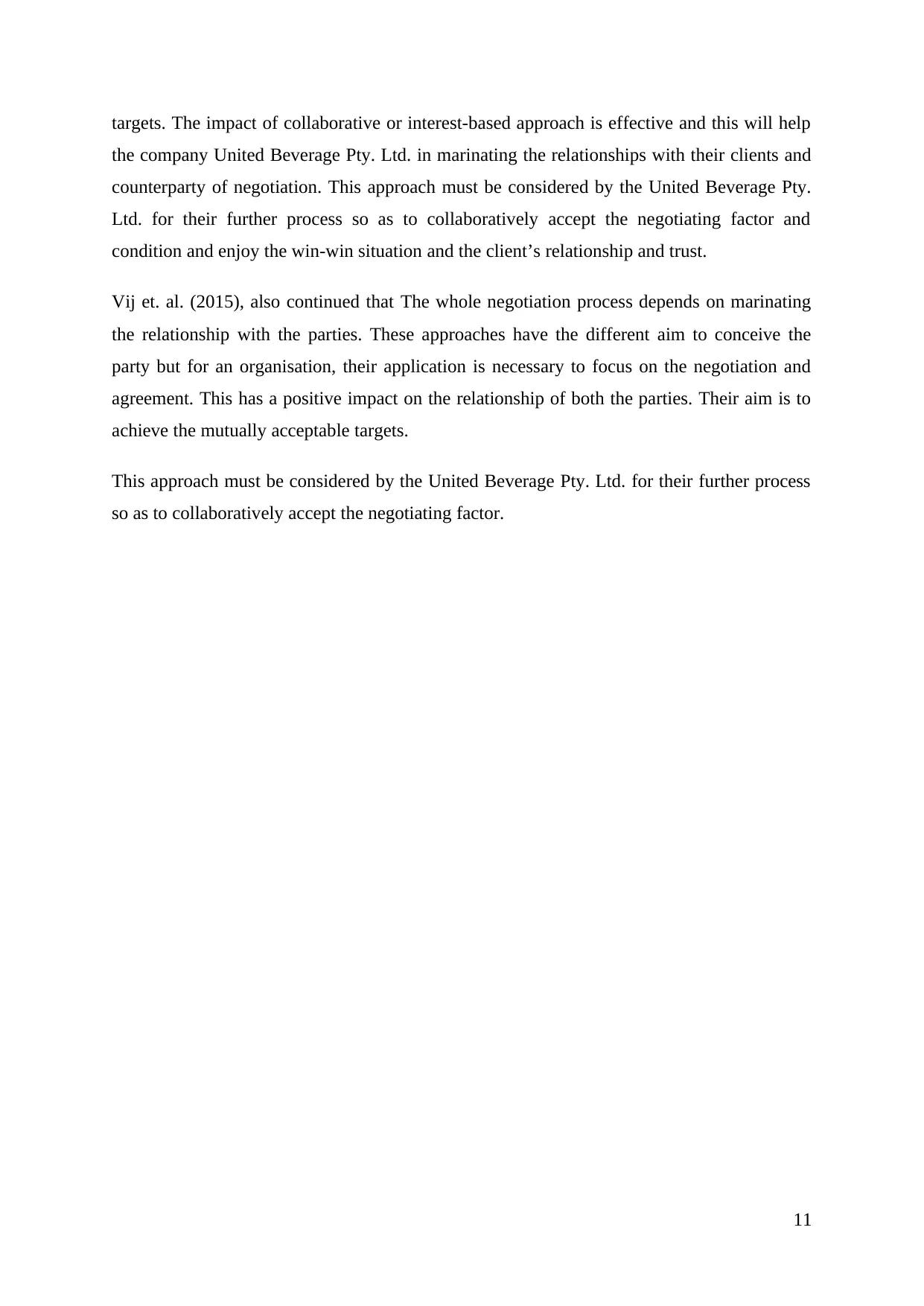
targets. The impact of collaborative or interest-based approach is effective and this will help
the company United Beverage Pty. Ltd. in marinating the relationships with their clients and
counterparty of negotiation. This approach must be considered by the United Beverage Pty.
Ltd. for their further process so as to collaboratively accept the negotiating factor and
condition and enjoy the win-win situation and the client’s relationship and trust.
Vij et. al. (2015), also continued that The whole negotiation process depends on marinating
the relationship with the parties. These approaches have the different aim to conceive the
party but for an organisation, their application is necessary to focus on the negotiation and
agreement. This has a positive impact on the relationship of both the parties. Their aim is to
achieve the mutually acceptable targets.
This approach must be considered by the United Beverage Pty. Ltd. for their further process
so as to collaboratively accept the negotiating factor.
11
the company United Beverage Pty. Ltd. in marinating the relationships with their clients and
counterparty of negotiation. This approach must be considered by the United Beverage Pty.
Ltd. for their further process so as to collaboratively accept the negotiating factor and
condition and enjoy the win-win situation and the client’s relationship and trust.
Vij et. al. (2015), also continued that The whole negotiation process depends on marinating
the relationship with the parties. These approaches have the different aim to conceive the
party but for an organisation, their application is necessary to focus on the negotiation and
agreement. This has a positive impact on the relationship of both the parties. Their aim is to
achieve the mutually acceptable targets.
This approach must be considered by the United Beverage Pty. Ltd. for their further process
so as to collaboratively accept the negotiating factor.
11
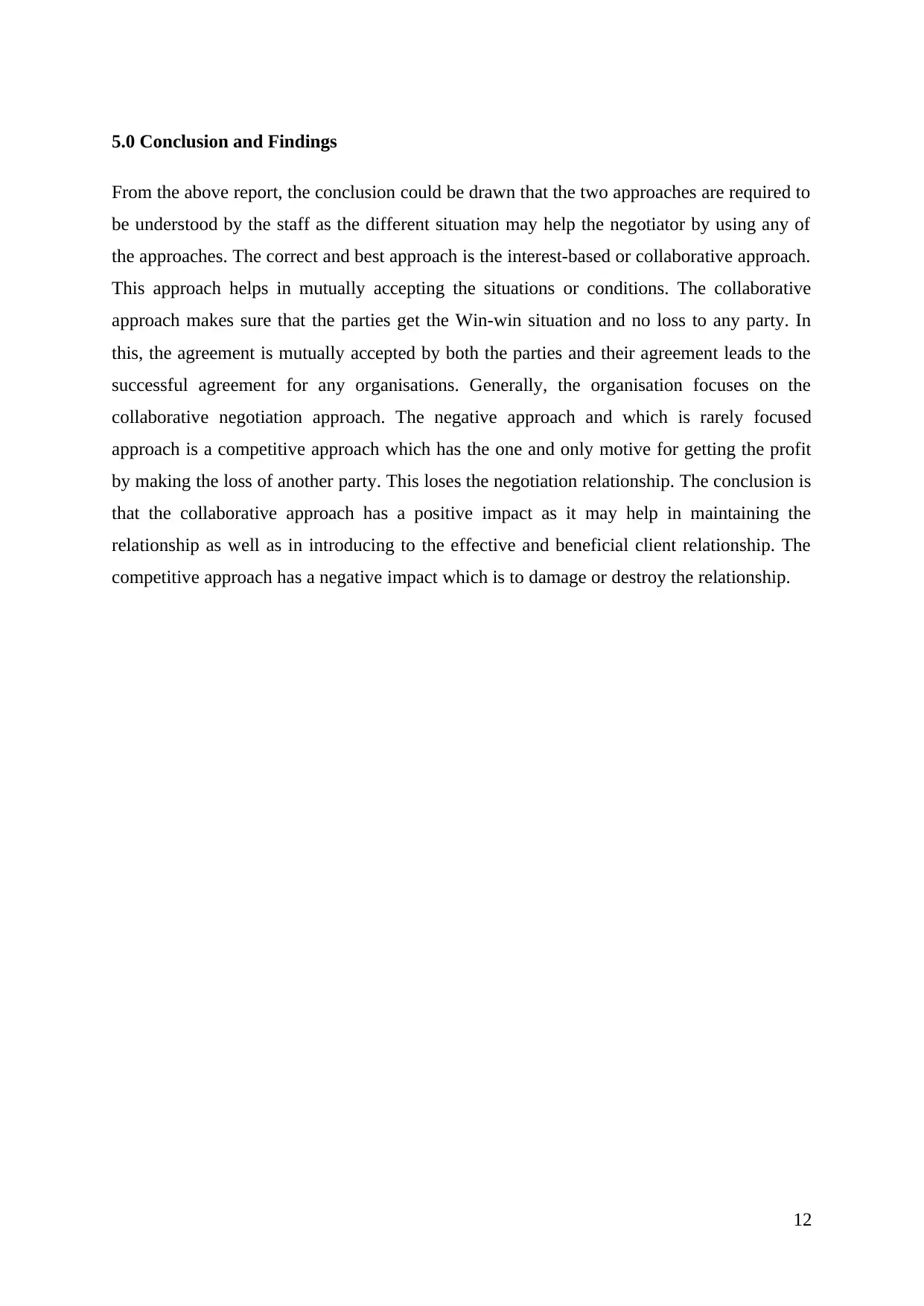
5.0 Conclusion and Findings
From the above report, the conclusion could be drawn that the two approaches are required to
be understood by the staff as the different situation may help the negotiator by using any of
the approaches. The correct and best approach is the interest-based or collaborative approach.
This approach helps in mutually accepting the situations or conditions. The collaborative
approach makes sure that the parties get the Win-win situation and no loss to any party. In
this, the agreement is mutually accepted by both the parties and their agreement leads to the
successful agreement for any organisations. Generally, the organisation focuses on the
collaborative negotiation approach. The negative approach and which is rarely focused
approach is a competitive approach which has the one and only motive for getting the profit
by making the loss of another party. This loses the negotiation relationship. The conclusion is
that the collaborative approach has a positive impact as it may help in maintaining the
relationship as well as in introducing to the effective and beneficial client relationship. The
competitive approach has a negative impact which is to damage or destroy the relationship.
12
From the above report, the conclusion could be drawn that the two approaches are required to
be understood by the staff as the different situation may help the negotiator by using any of
the approaches. The correct and best approach is the interest-based or collaborative approach.
This approach helps in mutually accepting the situations or conditions. The collaborative
approach makes sure that the parties get the Win-win situation and no loss to any party. In
this, the agreement is mutually accepted by both the parties and their agreement leads to the
successful agreement for any organisations. Generally, the organisation focuses on the
collaborative negotiation approach. The negative approach and which is rarely focused
approach is a competitive approach which has the one and only motive for getting the profit
by making the loss of another party. This loses the negotiation relationship. The conclusion is
that the collaborative approach has a positive impact as it may help in maintaining the
relationship as well as in introducing to the effective and beneficial client relationship. The
competitive approach has a negative impact which is to damage or destroy the relationship.
12
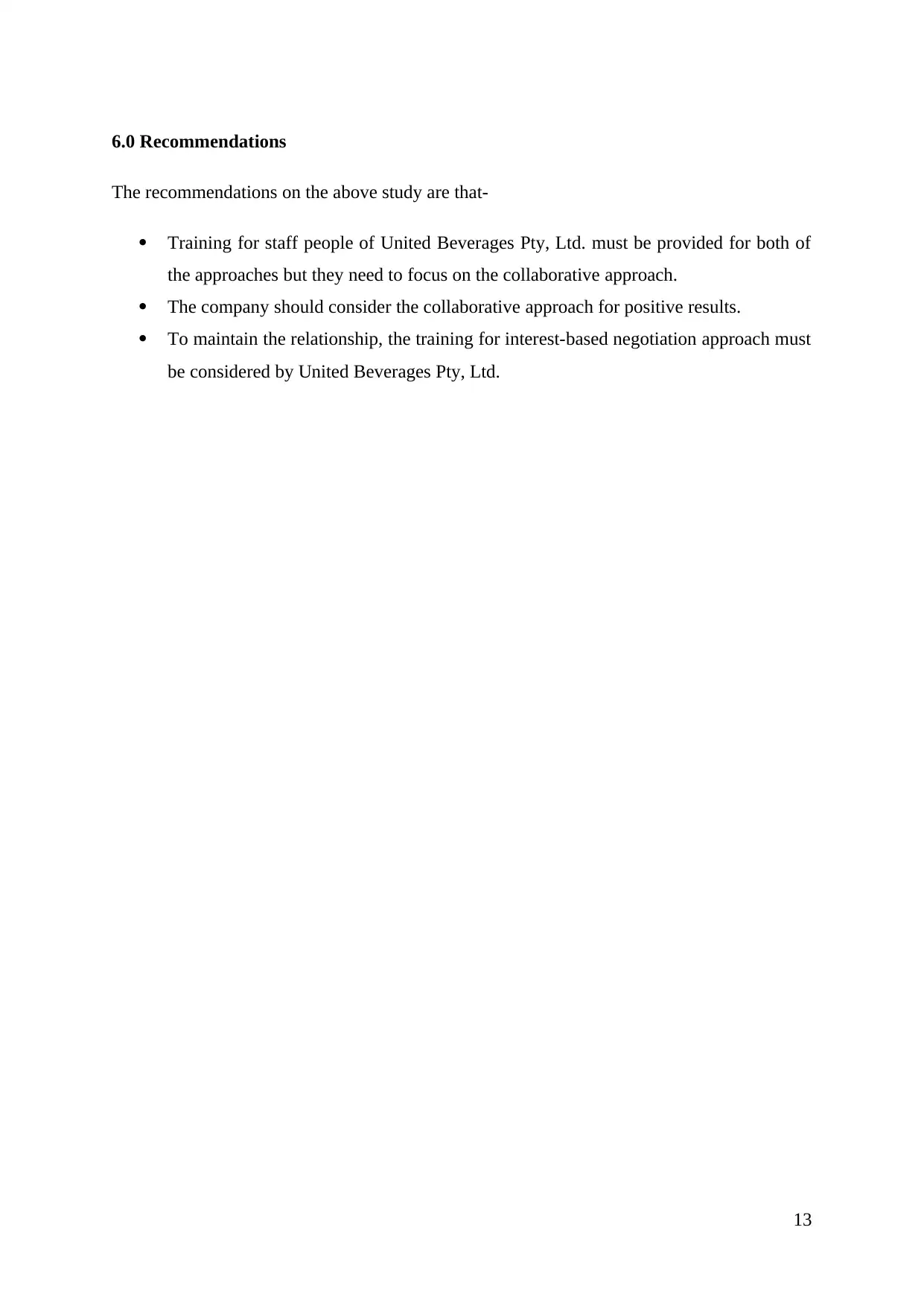
6.0 Recommendations
The recommendations on the above study are that-
Training for staff people of United Beverages Pty, Ltd. must be provided for both of
the approaches but they need to focus on the collaborative approach.
The company should consider the collaborative approach for positive results.
To maintain the relationship, the training for interest-based negotiation approach must
be considered by United Beverages Pty, Ltd.
13
The recommendations on the above study are that-
Training for staff people of United Beverages Pty, Ltd. must be provided for both of
the approaches but they need to focus on the collaborative approach.
The company should consider the collaborative approach for positive results.
To maintain the relationship, the training for interest-based negotiation approach must
be considered by United Beverages Pty, Ltd.
13
Paraphrase This Document
Need a fresh take? Get an instant paraphrase of this document with our AI Paraphraser
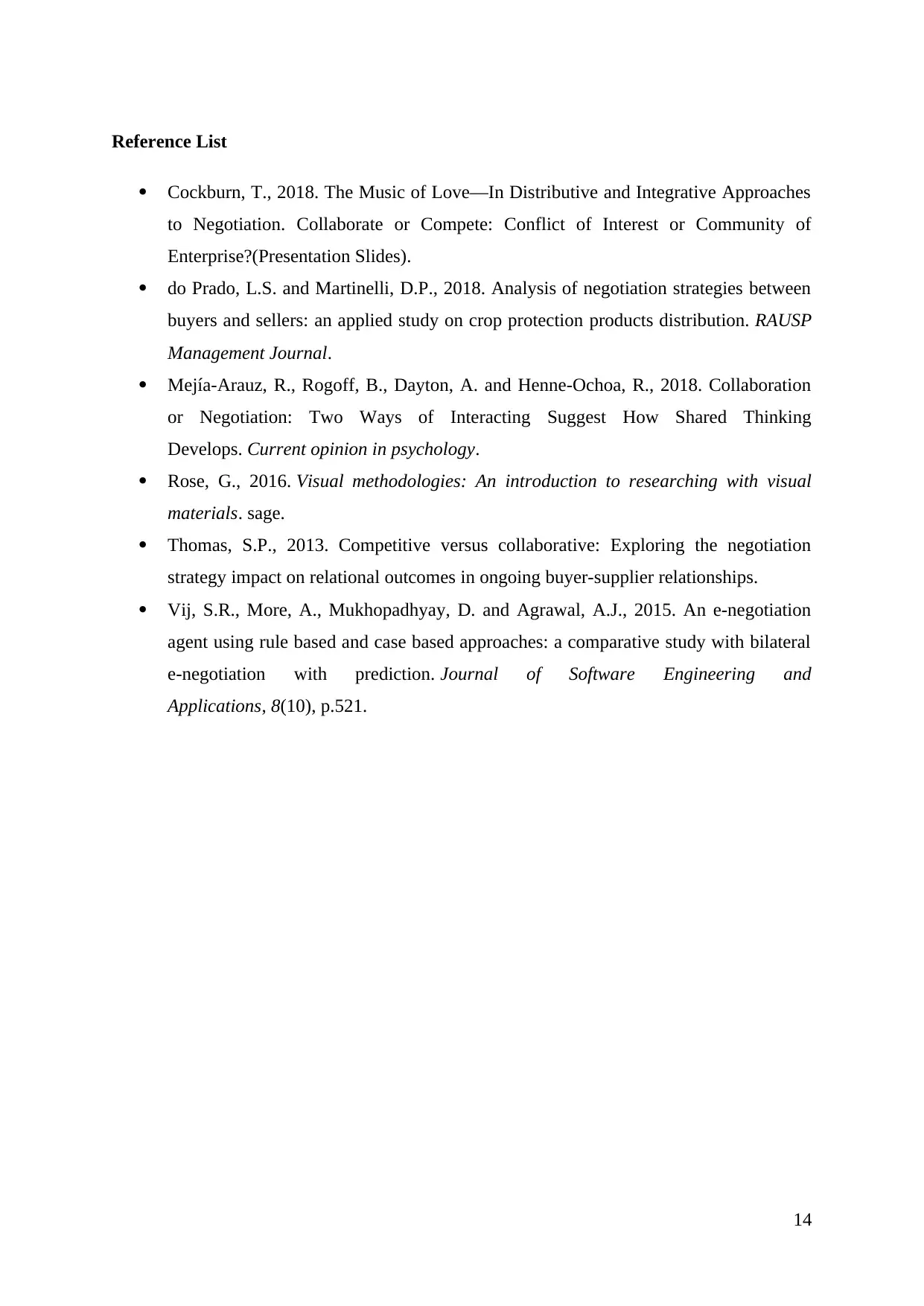
Reference List
Cockburn, T., 2018. The Music of Love—In Distributive and Integrative Approaches
to Negotiation. Collaborate or Compete: Conflict of Interest or Community of
Enterprise?(Presentation Slides).
do Prado, L.S. and Martinelli, D.P., 2018. Analysis of negotiation strategies between
buyers and sellers: an applied study on crop protection products distribution. RAUSP
Management Journal.
Mejía-Arauz, R., Rogoff, B., Dayton, A. and Henne-Ochoa, R., 2018. Collaboration
or Negotiation: Two Ways of Interacting Suggest How Shared Thinking
Develops. Current opinion in psychology.
Rose, G., 2016. Visual methodologies: An introduction to researching with visual
materials. sage.
Thomas, S.P., 2013. Competitive versus collaborative: Exploring the negotiation
strategy impact on relational outcomes in ongoing buyer-supplier relationships.
Vij, S.R., More, A., Mukhopadhyay, D. and Agrawal, A.J., 2015. An e-negotiation
agent using rule based and case based approaches: a comparative study with bilateral
e-negotiation with prediction. Journal of Software Engineering and
Applications, 8(10), p.521.
14
Cockburn, T., 2018. The Music of Love—In Distributive and Integrative Approaches
to Negotiation. Collaborate or Compete: Conflict of Interest or Community of
Enterprise?(Presentation Slides).
do Prado, L.S. and Martinelli, D.P., 2018. Analysis of negotiation strategies between
buyers and sellers: an applied study on crop protection products distribution. RAUSP
Management Journal.
Mejía-Arauz, R., Rogoff, B., Dayton, A. and Henne-Ochoa, R., 2018. Collaboration
or Negotiation: Two Ways of Interacting Suggest How Shared Thinking
Develops. Current opinion in psychology.
Rose, G., 2016. Visual methodologies: An introduction to researching with visual
materials. sage.
Thomas, S.P., 2013. Competitive versus collaborative: Exploring the negotiation
strategy impact on relational outcomes in ongoing buyer-supplier relationships.
Vij, S.R., More, A., Mukhopadhyay, D. and Agrawal, A.J., 2015. An e-negotiation
agent using rule based and case based approaches: a comparative study with bilateral
e-negotiation with prediction. Journal of Software Engineering and
Applications, 8(10), p.521.
14
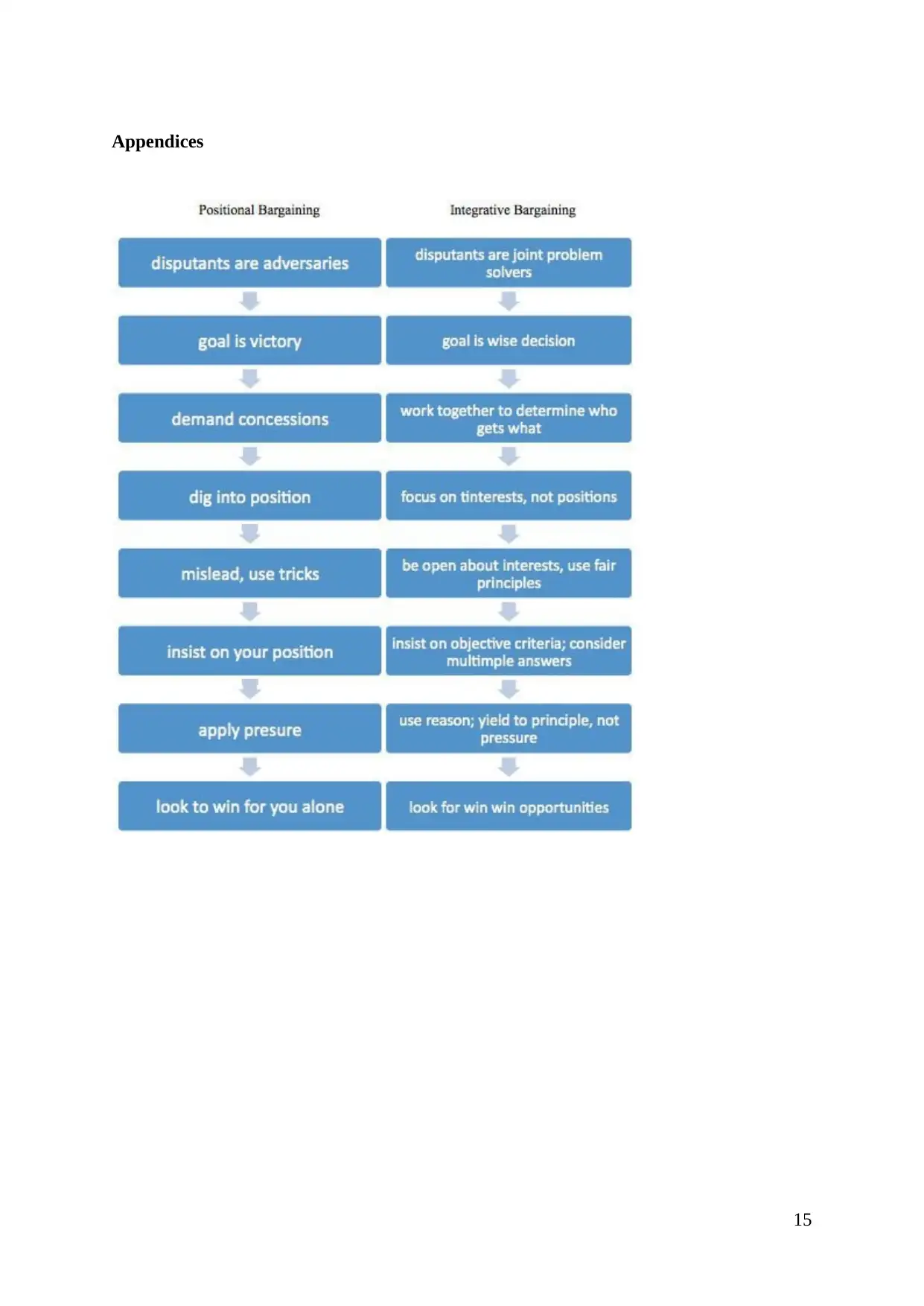
Appendices
15
15
1 out of 15
Related Documents
Your All-in-One AI-Powered Toolkit for Academic Success.
+13062052269
info@desklib.com
Available 24*7 on WhatsApp / Email
![[object Object]](/_next/static/media/star-bottom.7253800d.svg)
Unlock your academic potential
© 2024 | Zucol Services PVT LTD | All rights reserved.





